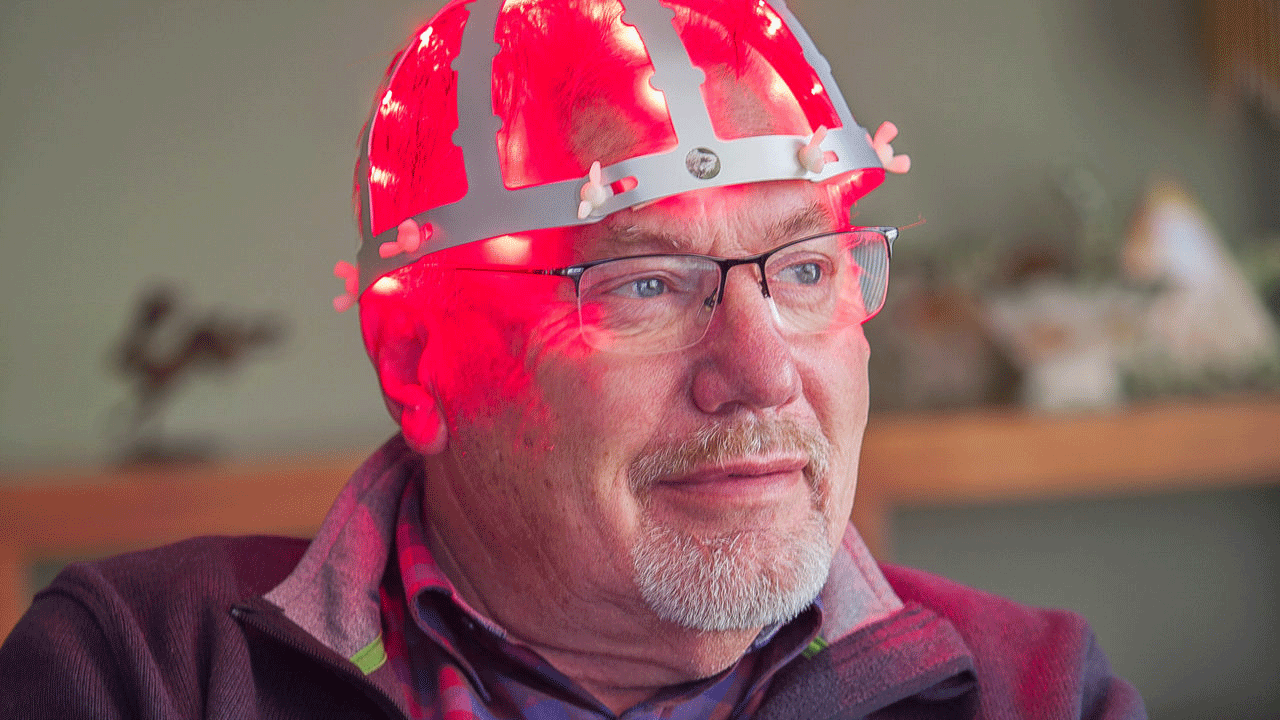
Light Therapy Offers Hope for Parkinson's Disease Patients
Parkinson's Disease affects the brain's ability to coordinate movement throughout the rest of the body7. Current treatments for Parkinson's Disease can temporarily improve symptoms, but cannot slow or cure the degeneration of the brain7. Photobiomodulation through Light Therapy may offer a way to protect the neurons in the brain and restore their function, giving hope to those suffering from Parkinson's Disease4-6,11.
Parkinson's
Parkinson's Disease is a neurodegenerative disease that kills cells in a part of the brain called the substantia nigra. This brain area is critical for producing dopamine and allowing us to plan and initiate coordinated bodily movements7. As these cells die, victims of the disease experience symptoms including shaking and tremors, loss of balance, and inability to control fine motor movements, making normal life impossible.
Parkinson's Disease also takes a huge mental toll on those afflicted - less dopamine in the brain can lead to depression, apathy, and lack of energy7. Even worse, no treatments can fully slow or cure the disease, meaning that victims of the disease and their loved ones can often feel scared and hopeless7.
Current treatments include medications that boost dopamine or invasive implants to restore function in the areas of the brain that are affected7. Both of these treatments come with harsh side effects and only improve symptoms temporarily7. Now, researchers are looking at photobiomodulation through light therapy to protect and heal brain cells at the cellular level and offer long term treatment options for Parkinson's Disease patients3-6,11.
Evidence: How Light Therapy can Help

Scientists have shown that near-infrared light affects our cells through a process called photobiomodulation2. Photobiomodulation reduces inflammation and reactive oxygen species that can harm and kill the mitochondria of our cells, which must be healthy to produce life-sustaining energy2.
Researchers believe that the anti-inflammatory properties of PBM could be a promising avenue for the treatment of Parkinson's Disease, protecting the mitochondria of substantia nigra cells from harm4-6. Below are studies on mice, monkeys, and humans that looked to harness Light Therapy as an innovative treatment for Parkinson's Disease:
- Light Therapy could be a treatment that can protect the brain at any stage of the disease progression, helping to prevent the worst symptoms of Parkinson's disease before they become a life-threatening issue8. One study found that photobiomodulation helped to protect mice's brains before, during, or after the onset of Parkinson's Disease, providing evidence that Light Therapy could offer both preventative care and treat severe symptoms once the disease progresses8.
- Parkinson's Disease is associated with brain bleeding and loss of cerebrospinal fluid, contributing to the decline of the brain's health9. A 2019 study found that PBM reduces brain bleeding and fluid leakages in mice, preventing one of the most severe symptoms of Parkinson's Disease9.
- Researchers that study the brains of monkeys with Parkinson's-like loss of neurons found that PBM helped to protect neurons at the cellular level1. Monkeys that received PBM had 60% more healthy striatal neurons than monkeys that did not receive PBM - a much more effective result than conventional Parkinson's medication1.
- Last year, a preliminary randomized clinical trial showed that PBM therapy significantly improved Parkinson's Disease patient symptoms over a period of 9 weeks10. Specifically, the treatment improved the patient's ability to walk and move without stumbling, tripping, or falling10. PBM only slightly restored other functions like coordinating and planning complex movements with their arms and legs, but overall, the results were promising for treating Parkinson's Disease10.
How Can You or Loved Ones Experience the Benefits of Light Therapy?
The benefits of Light Therapy extend beyond being a new avenue to treat Parkinson's Disease11 - the technology has been scientifically shown to reduce inflammation2, manage pain2, and help treat other neurodegenerative diseases like Alzheimer's Disease3. Light Lounge offers the latest in Light Therapy technology through in-person sessions (book here) and our shop. Our blog contains the latest research on light technology and other wellness topics. If you ever need more information, our team is happy to help on Facebook or Twitter.
CITATIONS:
- Photobiomodulation-induced changes in a monkey model of Parkinson’s disease: changes in tyrosine hydroxylase cells and GDNF expression in the striatum
- Mechanisms and applications of the anti-inflammatory effects of photobiomodulation
- Photobiomodulation for Alzheimer’s Disease: Has the Light Dawned?
- Exploring the use of transcranial photobiomodulation in Parkinson's disease patients
- Turning On Lights to Stop Neurodegeneration: The Potential of Near Infrared Light Therapy in Alzheimer's and Parkinson's Disease
- Neural Regeneration Research
- What is Parkinson's?
- Near-infrared light (670 nm) reduces MPTP-induced parkinsonism within a broad therapeutic time window
- Photobiomodulation Mitigates Cerebrovascular Leakage Induced by the Parkinsonian Neurotoxin MPTP
- Photobiomodulation in Parkinson's disease: A randomized controlled trial
- Trials begin for a new weapon against Parkinson's: light